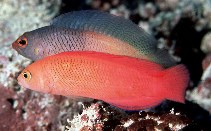| Family: |
Pseudochromidae (Dottybacks), subfamily: Pseudochrominae |
| Max. size: |
7.5 cm TL (male/unsexed) |
| Environment: |
reef-associated; marine; depth range 5 - 40 m |
| Distribution: |
Western Pacific: Great Barrier Reef and Papua New Guinea to Tonga. |
| Diagnosis: |
Dorsal spines (total): 3-3; Dorsal soft rays (total): 22-24; Anal spines: 3-3; Anal soft rays: 13-15. Lower lip either uninterrupted at symphysis or with weak interruption only. Caudal fin rounded; upper part with 6 (5-7) procurrent rays and 8 principal rays. Lateral line with anterodorsal series of 23 - 32 (usually 25 - 29) tubed scales extending from gill opening, and a peduncular series of 3 - 9 (usually 5 - 7) tubed scales. Dorsal and anal fins without distinct scaly sheaths (Ref. 37748).
Description: Characterized by male having red color with fine blue scale margins forming oblique lines on body; female with similar markings, head and front of body with bluish grey color grading to pale orange yellow posteriorly; gill cover usually with orange bar; depth of body 26.8-30.1 % of SL (Ref. 90102). |
| Biology: |
A cryptic species found in or near holes of coral and rock reefs, occurring on tide pools, lagoonal reefs, and reef slopes (Ref. 9710, 37748). Solitary or in pairs (Ref 90102). |
| IUCN Red List Status: |
Least Concern (LC); Date assessed: 10 March 2015 Ref. (130435)
|
| Threat to humans: |
harmless |
Source and more info: www.fishbase.org. For personal, classroom, and other internal use only. Not for publication.
